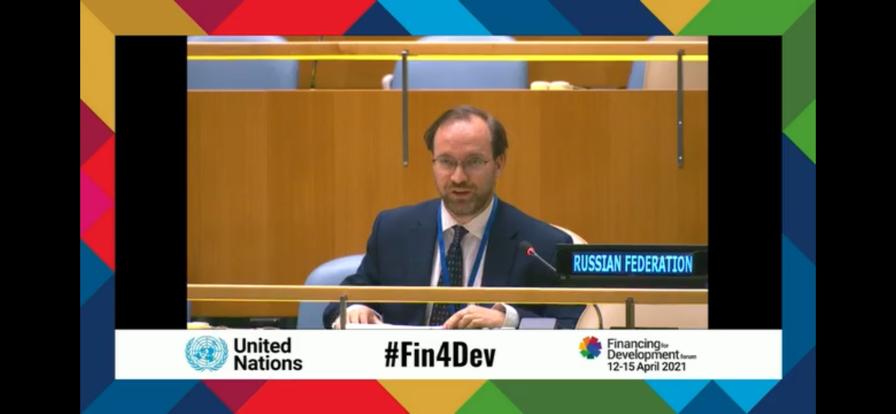Explanation of position by Representative of the Russian Federation Boris Meshchanov in connection with the adoption of the intergovernmentally agreed conclusions and recommendations of the ECOSOC forum on financing for development follow-up
Distinguished President of the Economic and Social Council,
The Russian Federation welcomes the adoption by consensus of the intergovernmentally agreed conclusions and recommendations of the ECOSOC forum on financing for development follow-up. It is important, that the Outcome document is balanced, substantial and ambitious to the extent possible. In this regard, please allow me to express our gratitude to the Co-Facilitators of the negotiations, Permanent Representatives of Netherlands and Fiji as well as their expert teams for the excellent work they’ve done. It is regrettable, however, that the time allocated for the consultations, proved insufficient to fully cover all the concerns that Member States may have had with respect to the Document.
Mr. Chairman,
We note the important message of the Outcome Document confirming the readiness of the world community to interact in the interests of a sustainable and equitable recovery based on a balance of three dimensions of sustainable development and in line with the goals and targets of the 2030 Agenda. In the center of our joint efforts in the near future will be ensuring economic growth, stepping up investment activity, guaranteeing social protection of people and countering negative trends in the field of climate change.
We welcome the emphasis of the Document on assisting countries in special situations, host countries, as well as countries of origin of refugees. This last message gives hope to millions of refugees that they will be able to return to their homes.
At the same time, we heed your attention to the fact that, as in previous years, the document failed to reflect in a proper manner the recognition by the international community of the negative impact of unilateral coercive measures introduced beyond the scope of the UN Charter (only the documents of the Secretary General are mentioned, which address the issue, among other things). Unilateral sanctions do not only make it difficult for countries to cope with the socio-economic impact of the pandemic and achieve the goals of the 2030 Agenda, but also have a most detrimental effect on the lives of ordinary people. Unfortunately, until now, countries that impose such restrictions have ignored calls to end this practice both from the UN Secretary General and the High Commissioner for Human Rights and the UN Special Rapporteur on the negative impact of sanctions on human rights, while humanitarian exemptions remain ineffective and insufficient. Moreover, they advocate unilateral sanctions in the hall of the General Assembly where numerous resolutions against sanctions were adopted.
In this context, we would like to once again draw attention to the initiative of Russian President Vladimir Putin to introduce the so-called “green corridors” free of trade wars and sanctions for essential goods, food, medicine and protective equipment being used to withstand the pandemic.
Mr. Chairman,
There is no doubt that universal vaccination is key to effectively addressing the pandemic and sustainable recovery. Widespread immunization against COVID-19 to prevent and stop transmission has been recognized by the World Health Assembly as a “global public good” for health. In this regard, we are actively engaged in various areas to ensure that all states can receive the required vaccines.
Mr. Chairman,
The Russian Federation attaches great importance to environmental protection, serves as an important participant in international processes in the environmental sphere and meaningfully contributes to the establishment of global environmental mechanisms. At the same time, we advocate for a depoliticized approach to the fight against climate change, as well as the unacceptability of the abuse of this topic to justify protectionism and put pressure on International Financial Institutions. We believe that each state has the right to choose the model of "green" transformation that is optimal for it, depending on the national circumstances of socio-economic development. We consider any attempts to impose artificial environmental standards as counterproductive.
In conclusion, we would like to reaffirm that the Russian Federation remains a significant and reliant donor of international development efforts. Our development assistance is implemented both through international programs and funds, and bilaterally. The total volume of Russian aid reaches 1 billion USD annually. In 2020, in addition to this, we delivered assistance to countries to fight against COVID-19, and the corresponding statistics have been reported on specialized platforms.
Our delegation should be grateful if this Explanation of Position could be included in the minutes of today's meeting and in the official records of the Forum on Financing for Development and the UN Economic and Social Council.
I thank you for your attention.
